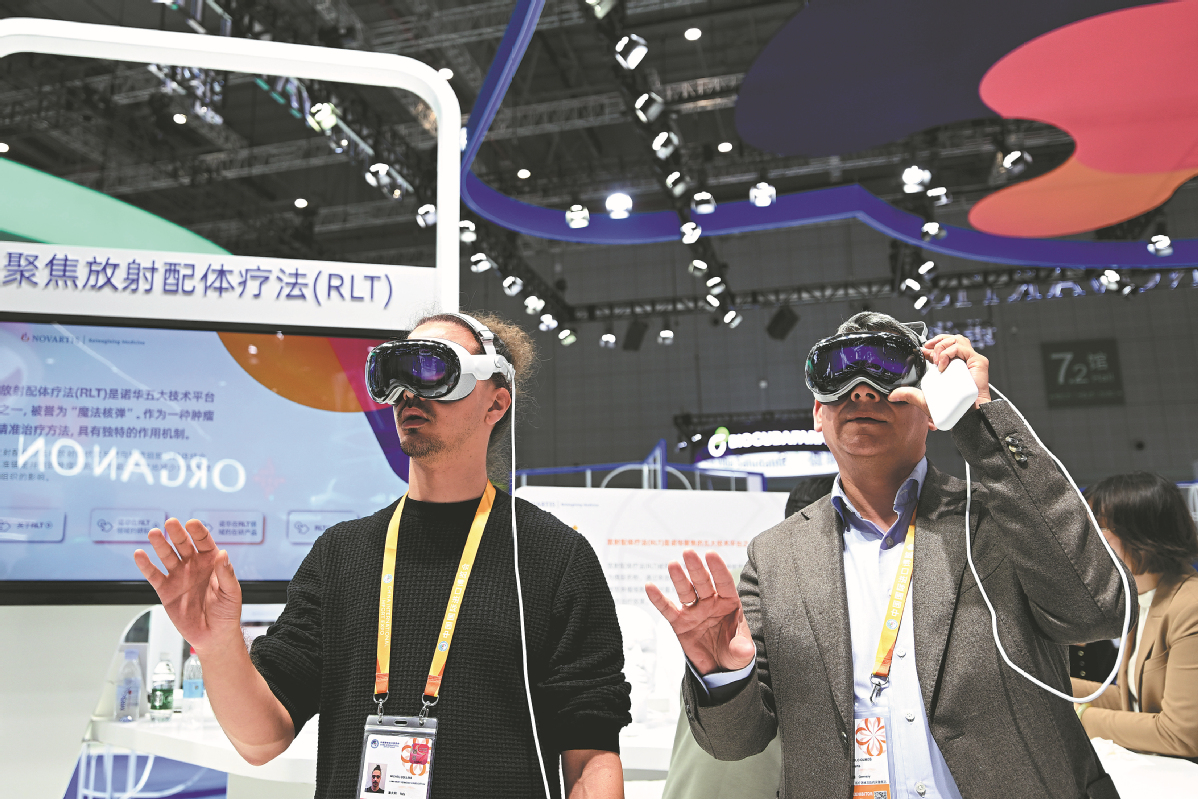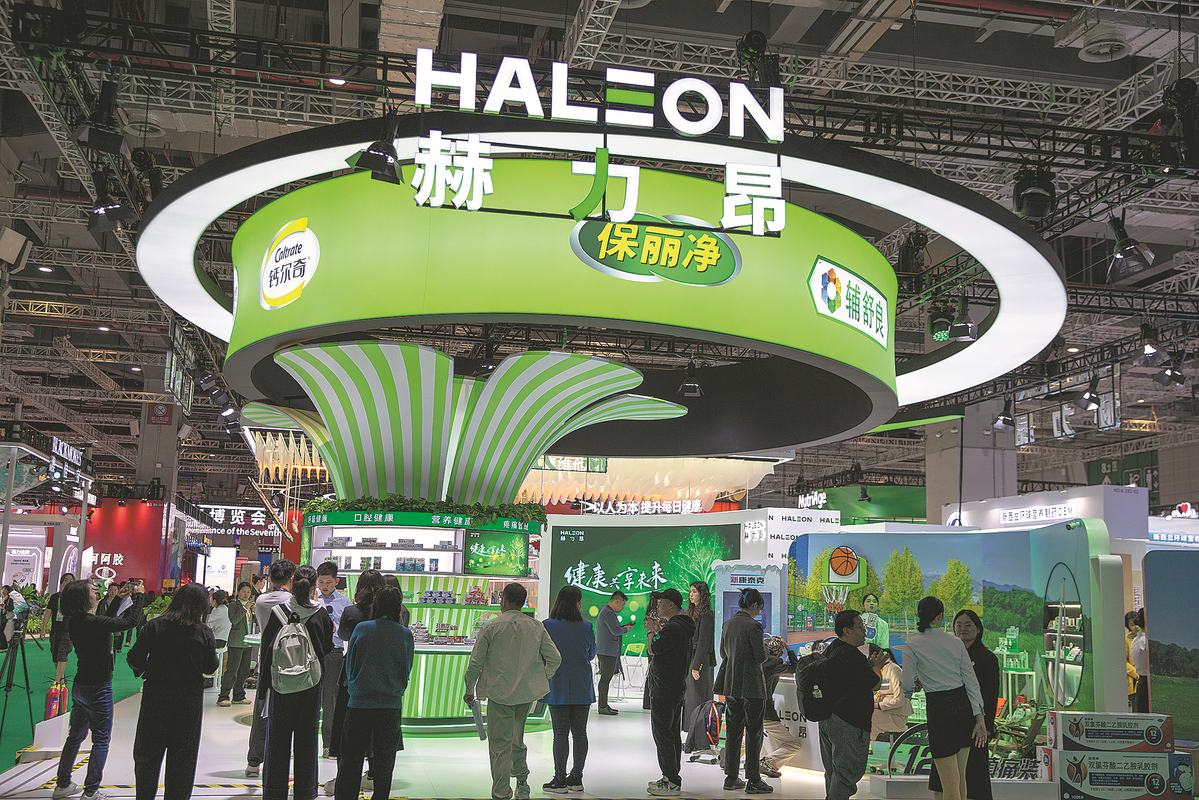
Visitors check out a healthcare service supported by virtual reality technology during the seventh China International Import Expo in Shanghai in November. [Photo/Xinhua]
Multinational corporations in the healthcare sector are increasingly integrating into the Chinese market through in-depth collaboration and localization in order to explore the huge market potential of the world's second-largest economy, according to executives at these firms.
United Kingdom-based consumer healthcare company Haleon inked a collaborative agreement with Peking University on Dec 16 to launch a joint laboratory focusing on pain management science.
Hu Henglong, vice-president of Haleon China, said establishing the joint lab, its first attempt in the Chinese market, is a major breakthrough in current innovation patterns for the company.
"We expect to actively conduct scientific research on pain for groups in China, explore new prospects of industrial application of new principles and technologies on pain science, and provide new products or solutions with great efficiency and safety, so as to better meet consumer expectations," said Hu, who is also head of China research and development for Haleon.
"Through the deepened cooperation between Peking University Health Science Center and Haleon, we hope to comprehensively explore the impact of pain on the physical and mental health of different groups of people and related triggering mechanisms, in order to provide a strong scientific basis for the active and effective pain management of patients," said Zhang Lei, general manager of Haleon China OTC (over-the-counter drugs).
More than 70 percent of the Chinese population suffer from reduced quality of life, including low-quality sleep, limited mobility and unenergetic work due to pain, even as chronic pain diagnosis and treatments are far from satisfying, according to Zhang.
"The purpose of establishing the pain science joint laboratory is to explore the cutting-edge areas of research on pain science, accelerate the transformation of scientific research results, promote science popularization and public health education, and empower the health of Chinese consumers," said Hu.
"We will leverage Haleon's strengths in consumer insights and innovation and research capabilities and Peking University's deep accumulation of scientific research and academic resources to fulfill the target," Hu added.

Haleon's booth is seen during the seventh CIIE in Shanghai in November. [Photo/China Daily]
Specifically, Haleon will be mainly responsible for proposing research directions and unsolved scientific problems based on market and consumer needs, and Peking University Health Science Center will focus more on organizing and coordinating the relevant scientific research resources. Their mutual goal is to research and develop first-class advanced solutions for Chinese people's pain management, according to Hu.
Unlike previous collaborations with universities, the joint lab features in-depth interaction, broad areas of cooperation as well as a forward-looking focus.
"We think that Haleon will receive more innovative inspirations by cooperating with these top Chinese institutions and experts promoting Haleon's development on R&D," he said.
China's health industry is projected to reach 9 trillion yuan ($1.23 trillion) in 2024, up from 8 trillion yuan in 2021, according to a report on the health industry by the China Consumers Association.
China's health industry expanded rapidly to have a market scale of 7.7 trillion yuan in 2023, with healthcare and elder care becoming important contributors, according to a report on China's health industry market potential by Chyxx.com, a Beijing-based industry research and consulting website.
Accounting for more than 40 percent of the general health industry, healthcare and eldercare are gradually developing in intelligent, specialized, and integrated ways. In the future, the share of the health and eldercare sectors in the broader health market is expected to expand further due to policy support and technological progress, said the report.
In November, US-based wellness company Melaleuca inked 410 million yuan's worth of strategic cooperation agreements with five major partners around the world during the seventh China International Import Expo, and the company further announced a commitment to completing a strategic collaborative procurement value of more than 1 billion yuan in the next two years.
Xu Wei, president of Melaleuca China, said China is not only one of its largest markets, but also a place where it invests the most in research and development.
According to Xu, partners reaching the 410 million yuan long-term strategic collaboration agreement with Melaleuca are all world-leading suppliers of raw materials, covering the sectors of health food, biological science, health and beauty, flavors and fragrances, and more, and they will work together to create high-quality and reliable health products for Chinese consumers.
"Significant efforts have been made to attract foreign investment in recent years in China, like the constantly improved and optimized business environment, as well as substantial support to foreign investment in terms of policy support, administrative services, legal and regulatory protection, talent introduction and R&D incentives," said Xu.
"Shanghai in particular is one of the world's most attractive destinations for foreign investment, and it is a natural choice for multinational companies to deploy their industrial chains, supply chains and innovation chains globally," Xu said.
Around 70,000 foreign-invested enterprises in Shanghai contributed to a quarter of the city's GDP, about one-third of tax payments, more than half of total industrial output by entities above a designated size (20 million yuan in main business revenue), and nearly two-thirds of its imports and exports, making Shanghai one of the world's most attractive destinations for foreign investment, China National Radio reported.
One of the examples of multinational companies' confidence comes from the annual CIIE, according to Jerry Felton, CEO of Melaleuca.
"CIIE creates a platform for us to gain a deeper understanding of global issues and trends, technological innovations, and cutting-edge science and products. On top of that, the relationships and strategic partnerships we built at this event proved to be invaluable," Felton said.
"The extended impact of the CIIE has led to our decision to build overseas regional headquarters, smart factories as well as an R&D center, and these investments will also bring a more diversified, localized and modern consumption experience for Chinese consumers," said Xu.
Likewise, New Zealand-based cellular health brand MitoQ is taking the annual CIIE as an important event in the company's calendar.
"The reason being, it is a chance for us to come here to showcase our brand among all of these other companies that are here to build those partnerships and really to draw the eyeballs in," said Mahara Inglis, CEO of MitoQ.
According to Inglis, MitoQ has been participating in the CIIE for six consecutive years since entering the China market in July 2018, and currently China is MitoQ's largest overseas market, followed by the United States.
MitoQ, which mainly sells its products online, has seen its business in China grow by double digits over the years, and the company has looked to introduce more products specifically designed for the needs of older consumers in China, providing scientifically proven anti-aging solutions to Chinese consumers.
With expectations of better tapping into the China market, which has placed an increasing emphasis on research and innovation in the field of life and health sciences, MitoQ initiated a collaboration with Zhejiang University last year.
This is hoped to benefit the company's China business and product development by better understanding the local market which has massive growth potential and is extremely competitive at the same time, Inglis said.
"The partnership with Zhejiang University represents a milestone in localized research and product development focused on the health concerns of Chinese consumers," Inglis said, adding that the company is looking to tap into the aging population, lifestyle tendency of leading a healthy life and people's pursuit of longevity.
wang_ying@chinadaily.com.cn